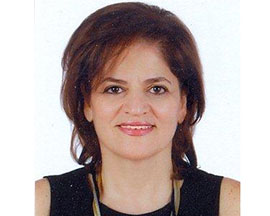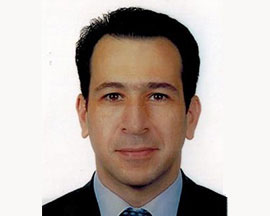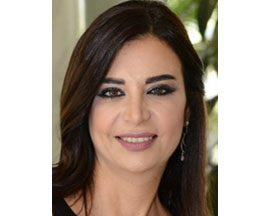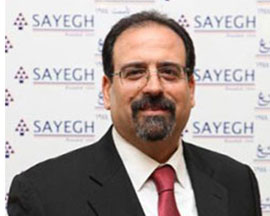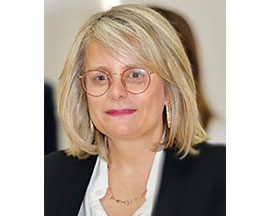
Pr. Patricia Rached
Doyenne de la Faculté des sciences de l’éducation- Université Saint-Joseph de BeyrouthSpeaker
| Themes | Presentations | Download |
|---|---|---|
| Theme 1 | La neuroéducation : les quatre piliers de l’apprentissage (Pr. Patricia Rached) | |
| Theme 2 | تطوير الذكاء العاطفي لقيادة صف فعالة (د. ميرنا الحاج) | |
| Theme 3 | المهارات الحياتية ودمجها في العملية التعليمية (د. إيفيت غريب) | |
| Theme 4 | التحفيز والابتكار من خلال التعلّم القائم على المشاريع وترابط المواد (د. باسم قنديل) | |
| Theme 5 | Portfolio Assessment: 360o view on students’ achievements (Dr. Tony Tohme) | |
| Theme 6 | Méthodes actives et motivation des élèves (Pr. Patricia Rached) | |
| Theme 7 | الإدارة التربوية: من الرؤية إلى الواقع (د. ميرنا الحاج) | |
| Theme 8 | الأهل والمدرسة نحو شراكة بناءة (د. إيفيت غريب) | |
| Theme 9 | المؤشرات التربوية واتخاذ القرار (د. باسم قنديل) | |
| Theme 10 | Standardized testing: Pros and Cons (Dr. Tony Tohme) | |
| Theme 11 | Évaluation selon l’approche par compétences (Pr. Patricia Rached) | |
| Theme 12 | أي مبادرة تربوية في العصر الحديث؟ (د. ميرنا الحاج) | |
| Theme 13 | الممارسات الصفّية في ضوء التغيير التربوي في العصر الحديث (د. إيفيت غريب) | |
| Theme 14 | Meaningful Learning: From Promise to Practice (Dr. Bassem Kandil) | |
| Theme 15 | المعايير الدولية لتصميم المناهج التربوية (د. طوني طعمه) |
La formation intitulée « La neuroéducation : les quatre piliers de l’apprentissage » initie les participants à l’apport des neurosciences cognitives en matière d’enseignement-apprentissage. Elle cible les quatre piliers de l’apprentissage qui sont « l’attention, l’engagement actif, le retour sur l’erreur et la consolidation » (Dehaene, 2018).
À l’issue de la formation, les participants seront sensibilisés aux actions suivantes :
- Identifier les quatre piliers de l’apprentissage
- Analyser l’implication des découvertes neuroscientifiques dans le processus d’apprentissage
- Mettre en œuvre des approches pédagogiques pour développer les habiletés intellectuelles des élèves
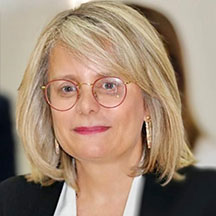
ترتكز قيادة الصف على شخصية المعلّم وأسلوبه في التعامل مع طلابه، لا سيما الأنماط السلوكية التي يستخدمها ليوفر بيئة تساهم في تحقيق الأهداف التعليمية المنشودة. يندرج هذا التدريب في إطار تعزيز قيادة الصف من خلال تطوير مهارات الذكاء العاطفي وقدرة المعلّم القائد على فهم قوة المشاعر واستخدامها بفاعليّة كمصدر للطاقة والتأثير والعلاقة البنّاءة مع الذات والآخر.
يهدف هذا التدريب إلى تحقيق النتائج المرجوة التالية:
- التعرف على مفهوم الذكاء العاطفي والأبعاد المرتبطة به
- تحليل استراتيجيات تفعيل القيادة الصفية المرتكزة على الذكاء العاطفي
- التدرب على أنشطة تعزز التعاطف والتعامل مع الطلاب
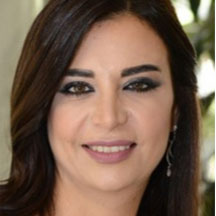
يهدف هذا التدريب إلى تمكين المشاركين من كيفية مواجهة تطورات العصر، وتعزيز المهارات الحياتية ودمجها في الاستراتيجيات
التعليمية في الصف. كما يساعدهم في بناء شخصية المتعلم القادر على تحمُّل المسؤولية، ودعم ثقافة الوعي لديه كي يتمكن من
التعامل فيما بعد مع الأوضاع المستجدة. ويساهم هذا التدريب أيضًا في تطوير تفكير المشاركين حول ضرورة إدراج هذه المهارات
في الممارسات الصفية وفي تعاملهم مع الآخرين.
في نهاية التدريب، سوف يتمكن المشاركون من:
- التعرف على المهارات الحياتية لمواجهة تحديات العصر كالاعتماد على النفس وقبول آراء الآخرين.
- النقد الذاتي حول كيفية تطوير ممارساتهم الصفية.
- إعداد حصة تربوية تُدمج فيها إحدى المهارات الحياتية.
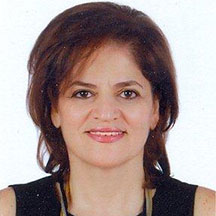
التعلم القائم على المشروع هو استراتيجية تربوية ينتج فيها الطلاب منتجًا يساهم في حلّ مشكلة واقعية. خلال ورشة العمل، سيتم عرض مميزات وفوائد التعلّم القائم على المشروع، وذلك من خلال التفاعل مع بعض الأمثلة؛ كما سيتم التطرق إلى المهارات المصاحبة ولا سيما التفكير الناقد.
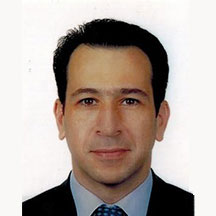
Portfolio is an effective assessment approach since it encourages students to improve and helps them to be critical
thinkers and independent, consequently motivating them in learning. Portfolios show the cumulative efforts and learning
of a particular student over time. They offer valuable data about student improvement and skill mastery. Along with
student reflection, that data provides valuable information about how each student learns and what is important to him
or her in the learning process. A portfolio is a living and changing collection of records that
reflect accomplishments,
skills, experiences, and attributes.
Continuous Assessment is the best method to evaluate the achievement of the
student.
Accordingly, this workshop will attempt to discuss the following:
- What is the main purpose of a portfolio for a student? (To assess student learning, as well as provide a way for
students to reflect on their own progress.)
- Can portfolio be a great help in evaluating learners’ performance?
- What is considered as the most important part in portfolio assessment? (The reflection component is the most critical
element of a good portfolio.)
- What are the three primary features of portfolio assessment? (1) purpose, 2) assessment criteria, and 3) evidence)
- What are the advantages of portfolio assessment? (Shows refinement in student performance, highlights student strengths,
multiple components of the curriculum can be assessed, e.g. writing, critical thinking, technology skills, etc.)
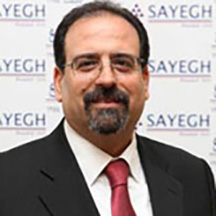
La formation intitulée « Méthodes actives et motivation des élèves » éclaire les participants sur les diverses méthodes actives, leur permettant de les investir dans leur enseignement. Les méthodes actives contribuent ainsi à optimiser l’apprentissage des élèves en favorisant leur motivation (Deci et Ryan, 2008).
À l’issue de la formation, les participants seront sensibilisés aux actions suivantes :
- Identifier les principales théories de l’apprentissage
- Intégrer les méthodes actives dans l’enseignement-apprentissage
- Analyser l’apport des méthodes actives sur la motivation des élèves

إنّ عملية اتخاذ القرار هي عملية علمية منظمة وغير عشوائية. إنّ اتخاذ القرارات التربوية أو الإدارية أو حتى الشخصية يجب أن يكون مبنيًّا على أدلة ومعطيات وبيانات وذلك من أجل تحقيق الغايات المرجوة من هذه القرارات. العديد من الأمثلة سيتم عرضها لتبيان الدور المحوري للمعطيات والبيانات في عملية اتخاذ أي قرار.

Standardized tests measure students’ knowledge of material that is deemed common knowledge for all children in their grade level. All standardized tests cover reading, language arts, and math, and some also include science, social studies, and other subjects. Reasons to consider standardized testing are:
• It is the most objective form of academic assessment.
• It is well recognized by academic institutions.
• It is used to know what grade level a student is in based on content knowledge. These tests can be more helpful than specific-subject placement tests.
Standardized tests scores are not predictors of future success. Standardized tests can only, at best, evaluate rote knowledge of math, science, and English. The tests do not evaluate creativity, problem solving, critical thinking, artistic ability, or other…
Standardized test scores are often tied to important outcomes, such as graduation. Standardized exams can show student improvement over time by taking the same tests over time. If the scores are strong, they may help increase a student's chances of admission by showing their academic strengths and potential. Students who perform well on standardized tests may find that their college application stands out among others.
Accordingly, this workshop will attempt to discuss the following:
- What are standardized tests?
- Effects of standardized testing on students and teachers.
- Pros and Cons of standardized tests.
- Examples of standardized tests.
- Why do standardized tests stress students?

La formation intitulée « Évaluation selon l’approche par compétence » initie les participants à l’approche par compétence dans l’évaluation des acquis des élèves. Elle implique un changement de paradigme dans les modalités d’évaluation afin de promouvoir la capacité d’analyse et la pensée critique des élèves (Roegiers, 2010).
À l’issue de la formation, les participants seront sensibilisés aux actions suivantes :
- S’initier à la notion de « compétence » et à « l’approche par compétences »
- Définir et formuler des résultats d’apprentissage
- Mettre en œuvre des stratégies d’évaluation selon la Taxonomie de Bloom

أي مبادرة تربوية في العصر الحديث؟
تولي المؤسسات التربوية اهتمامًا كبيرًا بالمشاريع الرائدة إيمانًا منها بضرورة مواكبة مستجدات العصر والحاجات المجتمعية المتغيرة. من هذا المنطلق، يأتي التدريب ليساهم في تزويد المشاركين، مدرسين ومسؤولين تربويين، بمقومات إعداد المبادارات والمشاريع في البيئة المدرسية إضافة إلى اعطائهم الأدوات المنهجية الأساسية لتطوير مهاراتهم في قيادة فريق المشروع، محدثين بذلك دينامية مؤسسية وتحفيزًا مستمرا بين أعضاء الهيئة التربوية.
يهدف هذا التدريب إلى تحقيق النتائج المرجوة التالية:
- التعرف على مكوّنات المشروع الرائد وفوائده
- بناء مشروع تربوي استنادًا إلى تخطيط منهجي
- تعزيز العمل ضمن فريق منسجم وناجح

يهدف هذا
يهدف هذا التدريب إلىتعريف المشاركين بالتحديات التي تواجه العملية التربوية في مجتمعنا الذي يعيش تغيرات متتالية. كما يسعى هذا التدريب أيضًا للتعرف على التداعيات التي تنعكس على تنشئة جيلٍ واعٍ ومسؤول. ويهدف إلى حثِّ المشاركين على التفكُّر حول إيجاد حلول جزئية لإعادة تفعيل القيم الأخلاقية لدى المتعلمين.
في نهاية التدريب، سوف يتمكن المشاركون من:
- التعرف على الضغوطات التي تواجه الجسم التعليمي وكيفية مواجهتها.
- التعرف على دور الجسم التعليمي في مواجهة هذه التغيرات.
- طرْح اقتراحات عملية تتوافق مع النظريات التربوية الحديثة.

Meaningful learning is the learning that remains after school is over. It is learning that we can use in our daily life to create or invent new things or to explain how things work. In this session, we will shed a light on the factors that hinder meaningful learning as well as those that facilitate this type of learning.

يقول طه حسين: "التعليم كالماء والهواء حق لكل إنسان"
وفق أحدث المعايير الدولية لتطوير المناهج الدراسية،
يتحقق التطوير من خلال شركة وطنية حقيقية تدفع باتجاه إصلاح العملية التربوية والتعليمية. إنّ تطوير المناهج الدراسية لا يتم إلا من خلال توفير بيئة ديمقراطية حرة، تشجّع على التفاعل واحترام حقوق كلّ من المعلّم والمتعلّم، وطرح جميع القضايا التربوية بحرية في جوٍّ تسوده العلاقات الإنسانية الراقية. مستقبل التعليم يكمن في «ديمقراطية التعليم». إنّ تطوير التعليم وتحديثه ليس من مسؤولية ومهمات وزير التربية أو وزارة التربية والتعليم أو القيادات التربوية والتعليمية فحسب، وإنما هو عمل وطني تشارك فيه جميع القطاعات والهيئات الرسمية وأساتذة الجامعات والمفكرون والنخب ومؤسسات المجتمع المدني ذات العلاقة.
المعايير العالمية لتطوير المناهج التعليمية
تقوم على مجموعة من المعايير وهي: معيار الصدق، معيار الأهمية، معيار اهتمامات التلاميذ، معيار القابلية للتعليم والتعلّم، معيار فائدة المنهاج الدراسي العملية والحياتية، معيار العالمية ويقصد به العامل الجغرافي أو المكاني، معيار التوافق ويقصد به اتفاق المنهاج الدراسي مع الوقائع الاجتماعية والثقافية للمجتمع المحلي.
وبناءً عليه، ستحاول ورشة العمل هذه مناقشة ما يلي:
- المعايير العالمية لتطوير المناهج الدراسية.
- من المسؤول عن تطوير المناهج الدراسية؟
- المناهج المبنية على الكفايات والمناهج المبنية على المعايير والمخرجات التعلّمية.
- تصميم المناهج ثلاثة أنواع: المناهج القائمة على المضمون التربوي، المناهج المتمحورة حول الطالب، والمناهج القائمة على حل المشكلة.
- دور المعلم في عملية تطوير المناهج.


